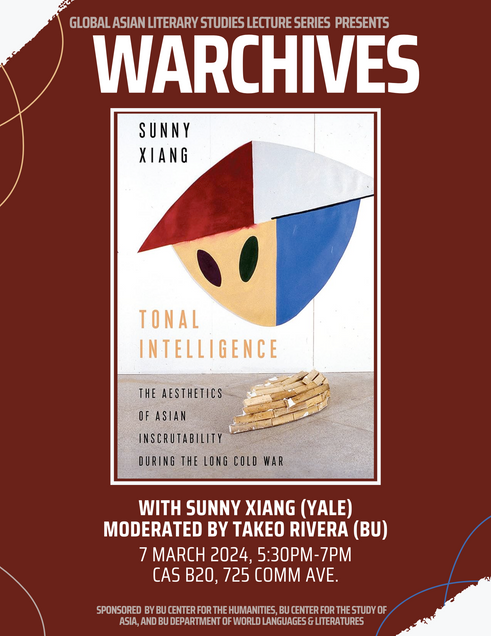Global Asian Literary Studies Lecture Series: Warchives (3/7)
“War” and “archive” are both necropolitical regimes prone to bleeding. What happens when they bleed into each other? Using the conceit of “warchives,” my talk asks: how have the temporalities, scales, and intensities of ongoing and incessant warfare reshaped the sensory habits and evidentiary norms through which we study it? That is, how have the militarization of daily life and the normalization of military violence changed what it means to perceive, archive, and analyze this bleeding thing called war? Part of my talk draws from my monograph, Tonal Intelligence: The Aesthetics of Asian Inscrutability During the Long Cold War (Columbia UP, 2020). Here, the portmanteau warchives allows me to delineate an archive of US cold war military intelligence and to model a method of analysis attuned to tone. This part of the talk reads Korean American poet Don Mee Choi’s 2016 mixed media book Hardly War alongside the CIA’s in-house journal Studies in Intelligence. I then shift to our current moment of living, writing, and teaching war. Here, too, warchives perhaps give us something to work with, a feeling if not a theory. Can the bleed and rhyme, the stutter and scat, the repetition and coincidence, the lack of space and breath, animated by warchives help us begin to describe my, your, our militarized present? I offer some thoughts and questions based on the inadequacies I’ve come up against this semester while teaching a course called “War and Everyday Life.”
Speaker Bio: Sunny Xiang is a professor of English and Ethnicity, Race, & Migration at Yale University. Her research and teaching focus on US military empire in Asia and the Pacific Islands.
Moderator/Discussant: Takeo Rivera (English, Boston University)
Date: Thursday, March 7, 2024, 5:30-7 pm
Place: CAS B20
